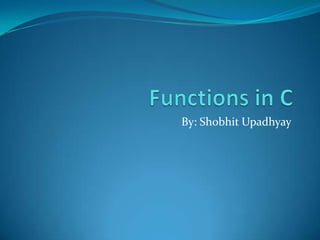
Functions in C
- 2. Functions A function is a self contained block of code that performs a particular task. Any C program can be seen as a collection/group of these functions. A functions takes some data as input, perform some operation on that data and then return a value. Any C program must contain at least one function, which is main(). There is no limit on the number of functions that might be present in a C program.
- 3. For ex. main() { message(); printf(“I am in main”); } message() { printf(“I am in message”); }
- 4. Function Prototype All Identifiers in C must be declared before they are used. This is true for functions as well as variables. For functions, the declarations needs to be done before the first call of the function. A function declaration specifies the name, return type, and arguments of a function. This is also called the function prototype. To be a prototype, a function declaration must establish types for the function’s arguments. Having the prototype available before the first use of the function allows the compiler to check that the correct number and types of arguments are used in the function call.
- 5. The prototype has the same syntax as the function definition, except that it is terminated by a semicolon following the closing parenthesis and therefore has no body. Although, functions that return int values do not require prototypes, prototypes are recommended.
- 6. Function Definition General form of any function definition is: return-type function-name(argument declarations) { declarations and statements } Return-type refers to the data type of the value being returned from the function. If the return type is omitted, int is assumed. The values provided to a function for processing are the arguments. The set of statements between the braces is called as the function body.
- 7. Arguments – Call by Value In C, all functions are passed “by value” by default. This means that the called function is given the values of its arguments in temporary variables rather than the originals. For ex. main() { int a=4,b=5; sum(a,b); printf(“Sum = %d”,a+b); } sum(int a,int b) { a++; b++; printf(“Sum = %d”,a+b); }
- 8. Arguments – Call by Reference When necessary, it is possible to arrange a function which can modify a variable in a calling routine. The caller must provide the address of the variable to be set (generally, a pointer to a variable), and the called function must declare the parameter to be a pointer and access the variable indirectly through it. For ex: main() { int a=4,b=5; sum(&a,&b); printf(“Sum = %d”,a+b); } sum(int *a,int *b) { (*a)++; (*b)++; printf(“Sum = %d”,(*a)+(*b)); }
- 9. Recursion Recursion defines a function in terms of itself. It is a programming technique in which a function calls itself. A recursive function calls itself repeatedly, with different argument values each time. Some argument values cause the recursive method to return without calling itself. This is the base case. Either omitting the base case or writing the recursion step incorrectly will cause infinite recursion (stack overflow error).
- 10. Recursion to find the factorial of any number: int factorial(int x) { if(x<=1) return 1; else return(x*factorial(x-1)); }
- 11. External Variables See the below example: main() { extern int a; printf(“Value of a = %d”,a); } int a=5; Output: Value of a = 5
- 12. Scope Rules Example: int num1 = 100; //Global Scope static int num2 = 200; //File Scope int main() { int num3 = 300; //Local Scope if(num2>num1) { int i=0; //Block Scope printf(“Value of i = %dn”,i++); } printf(“Value of num1 = %dn”,num1); printf(“Value of num2 = %dn”,num2); printf(“Value of num3 = %dn”,num3); }
- 13. Static Variables Example: static int min = 10; int setmax() { static int max = 100; return ++max; } main() { min++; printf(“Value of max = %d”, setmax()); printf(“Value of max = %d”, setmax()); printf(“Value of min = %d”, min); }
